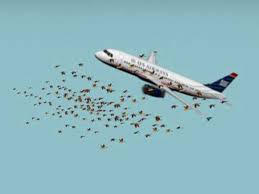 Every year airline companies in the U.S. as well airports and aviation companies are paying billions of dollars due to wildlife strikes! Building a plane isn’t cheap and repairing a plane after it collides with an animal like a deer or goose isn’t like fixing a car headlight. There have been several recent high profile newsworthy events of wildlife strikes. Former Vice President Mike Pence and Airforce 2 making an emergency landing due to a bird strike, and the most famous or memorable was the US Airways Flight 1549 landing on the Hudson River after colliding with Geese. This was notorious and important for several reasons. One it made Captain Sully Sullenberger a legend and very wealthy, two Tom Hanks won an Oscar for his performance in Sully but third and most important for the Wildlife Management industry and for every airport in the world, it showed that a bird strike can happen anywhere anytime. Now some bird strikes are going to happen no matter what, however many of collisions can be prevented by having an up to date and well executed Wildlife Hazard Management Plan and outsourcing to professionals like Loomacres Wildlife Management. (Learn More Click Here) The FAA has always addressed the importance of wildlife collisions being prevented by airports. Certain policies, procedures and regulations are mandatory for airports to comply with to ensure safety for airlines, and passengers. Below are a few mandatory items that must be implemented or complied with for airports that are classified under the FAA Title 14 Part 139.337 (e) & (f).
These are just a few examples of what the FAA has instituted for all airports that fall under the classification of Title 14 Part 139. These policies and regulations are in place to keep airport managers accountable and proactive in preventing wildlife strikes with aircrafts because at the end of the day it’s the Airport Manager who is liable and responsible for safe take off and landings. Information is key to preventing future risks and collisions. All wildlife strikes should be reported and logged in the FAA Strike Database. For more information or to schedule a WHA, WHMP Review, or Wildlife Hazard Management Training please fill out the field below. Loomacres - 800-243-1462 Bringing Wildlife Management to a Higher Level ©
0 Comments
Leave a Reply. |
Sales & Marketing
|
 RSS Feed
RSS Feed